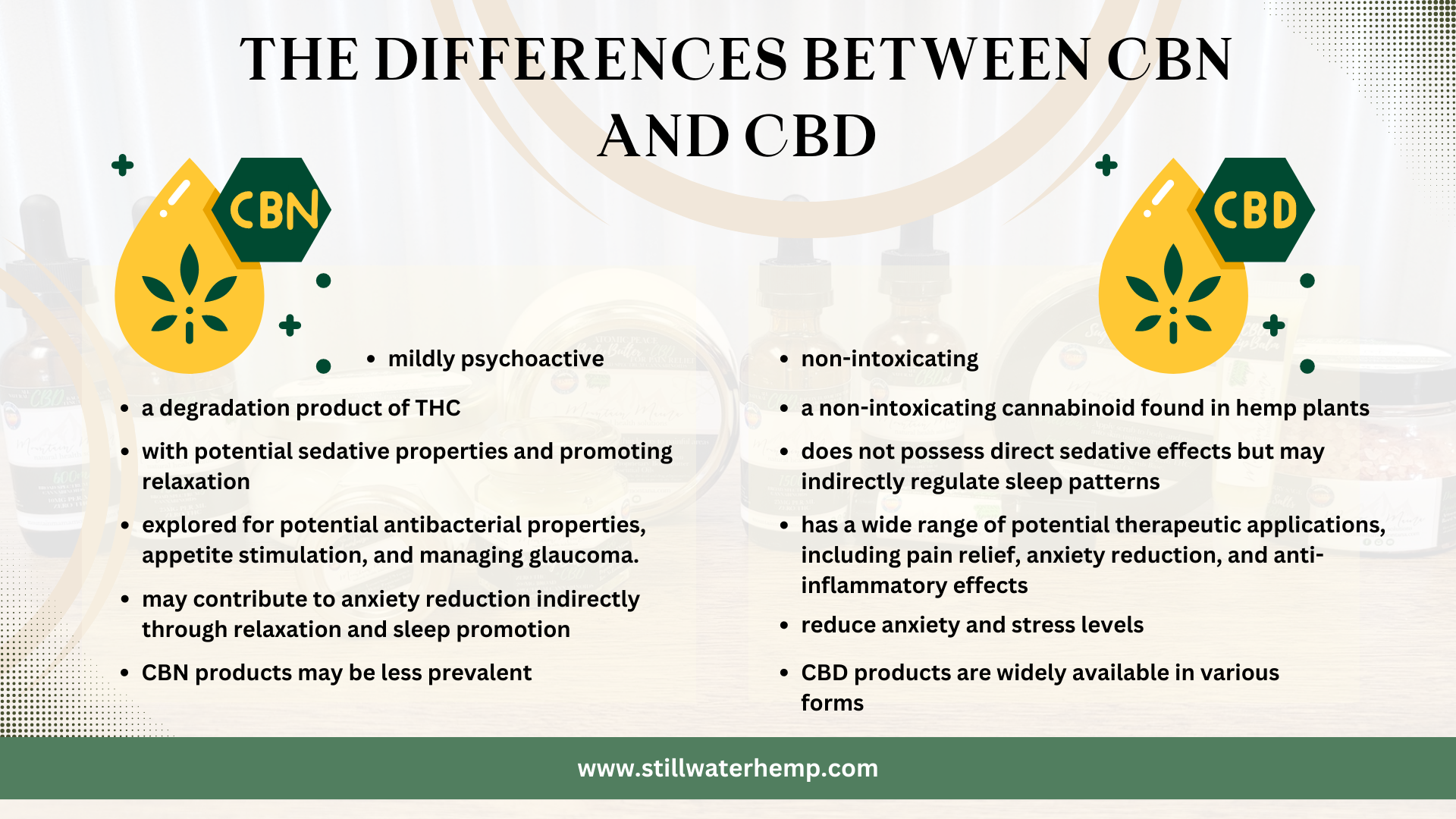The Differences Between CBN and CBD

In recent years, cannabinoids have gained significant attention for their potential therapeutic benefits. Among the numerous compounds found in the cannabis plant, two have emerged as particularly noteworthy: Cannabinol (CBN) and Cannabidiol (CBD). While both CBN and CBD offer unique properties, it's crucial to understand their differences to make informed decisions about their usage. In this article, we delve into the differences between CBN and CBD, helping you navigate the world of cannabinoids.
CBN vs. CBD
Cannabinol (CBN) and Cannabidiol (CBD) are distinct compounds derived from the cannabis plant, but they differ in their chemical composition and effects on the body.
- Composition: CBN is a degradation product of THC (tetrahydrocannabinol), forming as THC ages or undergoes exposure to heat or oxygen. On the other hand, CBD is a non-intoxicating cannabinoid found in hemp plants.
- Psychoactive Properties: CBN is mildly psychoactive, although significantly less so than THC. CBD, however, is non-intoxicating, meaning it does not produce a "high" sensation.
- Effects on Sleep: CBN has been associated with potential sedative properties and is often praised for its ability to promote relaxation and aid in sleep. CBD, on the other hand, does not possess sedative effects but may help regulate sleep patterns indirectly.
Key Variances: CBN vs. CBD:
While both CBN and CBD interact with the endocannabinoid system (ECS), they have distinct mechanisms of action and potential applications.
- Potential Therapeutic Benefits: CBD has garnered attention for its wide range of potential therapeutic applications, including pain relief, anxiety reduction, and anti-inflammatory effects. CBN, while less studied, has been explored for its potential antibacterial properties, appetite stimulation, and as a potential aid in managing glaucoma.
- Anxiety and Stress: CBD has demonstrated promising effects in reducing anxiety and stress levels. CBN, on the other hand, is believed to have a more indirect impact on anxiety, primarily by promoting relaxation and aiding sleep.
- Pain Management: CBD has shown potential in alleviating chronic pain by interacting with the ECS and influencing neurotransmitter activity. CBN, though less studied in this area, may contribute to pain relief through its potential anti-inflammatory properties.
Choosing the Right Cannabinoid:
CBN vs CBD, which one is right for you? When deciding between CBN and CBD, it's crucial to consider your specific needs and desired effects.
- Sleep Aid: If you struggle with insomnia or sleep disturbances, CBN may be worth exploring due to its potential sedative properties. However, CBD's indirect influence on sleep patterns and potential anxiety reduction may also be beneficial.
- Pain Relief: CBD's well-documented analgesic properties make it a compelling option for individuals seeking relief from chronic pain. While CBN may contribute to pain management, more research is needed to fully understand its efficacy.
- Other Considerations: It's worth noting that CBD products are widely available in various forms, including oils, capsules, and topicals, while CBN products may be less prevalent. Additionally, individual responses to cannabinoids can vary, so personal experimentation and consultation with healthcare professionals are recommended.
Conclusion:
In summary, while both CBN and CBD are cannabinoids derived from the cannabis plant, they possess distinct properties and potential applications. CBD is non-intoxicating and offers a broad spectrum of potential therapeutic benefits, while CBN exhibits mild psychoactive properties and is often associated with sleep-promoting effects. Understanding the differences between these cannabinoids allows you to make informed decisions when considering their usage. Remember, before incorporating cannabinoids into your wellness routine, consult withyour healthcare provider to ensure it aligns with your specific needs and existing medical conditions. By staying informed, you can make educated choices about whether CBN or CBD is the right cannabinoid for you.

Join the Community
Sign up for our newsletter to stay up to date on all our new products!
Contact Us
We will get back to you as soon as possible
Please try again later

